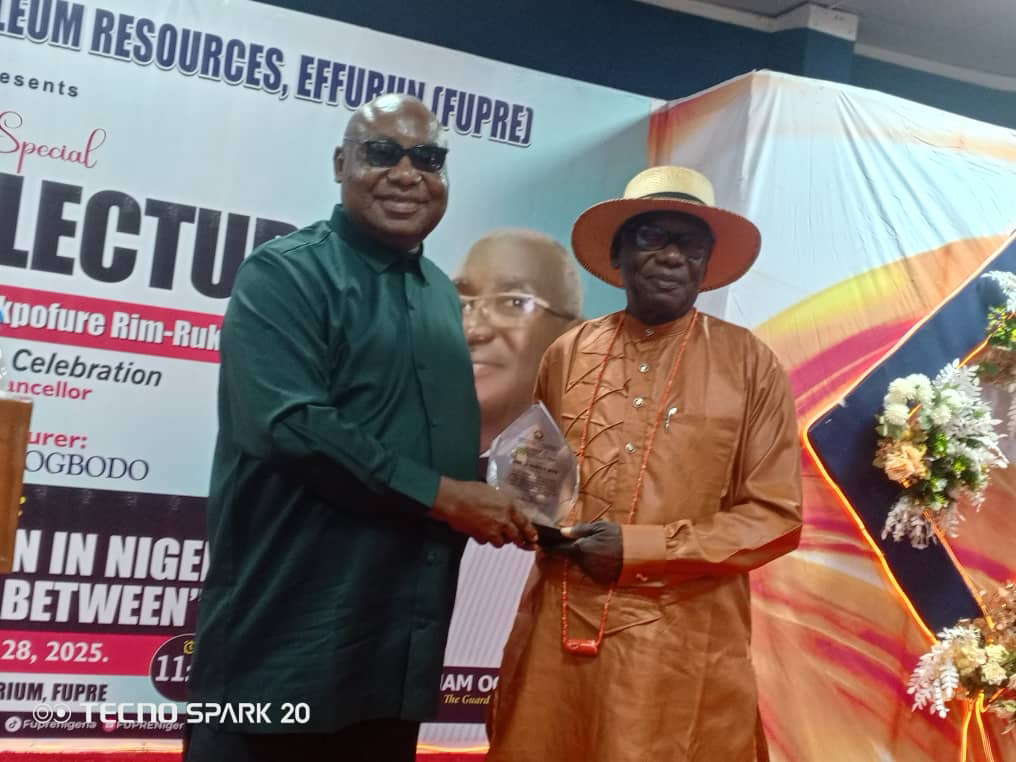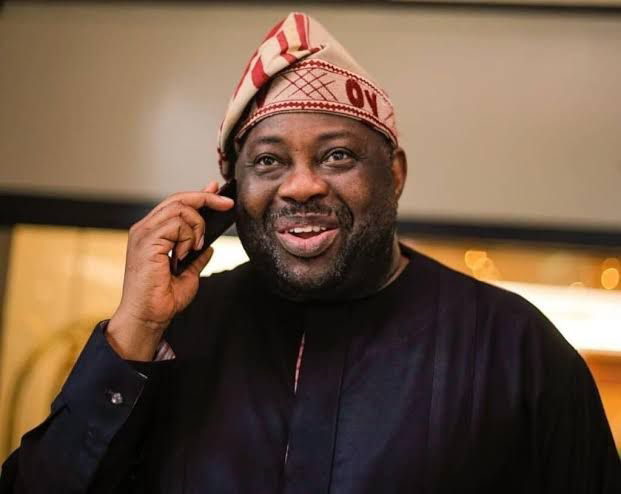Abraham Ogbodo, the former Editor-in-Chief of The Guardian newspaper, delivered a thought-provoking public lecture on Monday, April 28, 2025, titled “The Gown and Town in Nigeria: The Issues In Between,” in honor of the outgoing Vice Chancellor of the Federal University of Petroleum Resources (FUPRE), Engr. Prof. Akpofure Rim-Rukeh.
This event marked the end of Prof. Rim-Rukeh’s successful tenure as Vice Chancellor.
The lecture, held at FUPRE’s 500-capacity auditorium, attracted a distinguished audience, including top university management, principal officers, professors from various institutions, captains of industry, and other prominent dignitaries, making it a remarkable occasion.
In his address, Ogbodo traced the historical roots of the academic gown, linking it to its medieval European origins and its adaptation by Oxford and Cambridge as part of academic rituals.
He then discussed the critical relationship between academia (the “Gown”) and the broader society (the “Town”). Drawing from the first through fourth industrial revolutions in Europe, he explained how universities served as the laboratories that spurred the technological advancements shaping the modern world.
He highlighted the example of Stanford University in the United States, which contributed to the rise of Silicon Valley, and urged FUPRE to aspire to play a similar role in Delta State, contributing significantly to the region’s development.
Ogbodo lamented that Nigerian universities have not had the same robust impact on their surrounding communities as universities in other parts of the world.
He questioned why the Gown in Nigeria has not yet fully connected with the Town, despite the vast potential within Nigerian academia.
He acknowledged the many obstacles, including the historically inadequate budgetary allocations to education compared to defense, but emphasized that the university must find ways to thrive regardless of these challenges.
“The Gown must conquer,” Ogbodo asserted, stressing that universities should always aim to find solutions, regardless of external challenges.
He stated, “The Gown is fashioned to conquer, whether the weather is black or whether the weather is blue.”
Ogbodo further challenged Nigerian universities, urging them to take proactive steps in addressing national issues.
He asserted that the Gown
must not only respond to crises but should be a central player in finding solutions for the Town.
He spoke of the need for academic institutions to combine character and competence, as this would allow them to deliver sustainable value.
The relationship between the Gown and the Government was also a key point of discussion.
Ogbodo reflected on the long-standing issue of ASUU (Academic Staff Union of Universities) strikes and government’s failure to implement agreements with the union.
He noted that strike actions, although well-intentioned, had failed to achieve lasting solutions and had become counterproductive over the years.
“Strike actions have not produced positive results or solutions,” he said, emphasizing that the Gown must seek alternative methods of engagement with government. He cited examples from Ghana, where universities experienced extended strikes but eventually achieved progress.
The lecture concluded with a call for universities to address the character gap and strive for a more purposeful and effective approach to solving the problems between the Gown and the Town. Ogbodo stressed that achieving progress requires more than just resources—it requires the right mindset and character.
Prof. Akpofure Rim-Rukeh, in his remarks, expressed gratitude to the event’s chairman, Engr. Alex Neyin, FNSE, the guest speaker, and all the attendees for their participation. He highlighted the importance of the Gown-Town relationship in driving societal change and progress, noting that the topic was particularly relevant to the university’s mission and vision.
Engr. Alex Neyin, in his goodwill message, echoed Ogbodo’s sentiments, emphasizing the need for a stronger connection between academia and industry.
He pointed out that while FUPRE has made significant strides in petroleum education, there is still room for improvement in terms of its impact on the surrounding community.
He also proposed that innovations and patents from universities should be channeled to individuals and industries that can commercialize them and make them productive.
The event ended on a note of optimism, with attendees reflecting on the lecture’s relevance to the challenges facing Nigerian universities and the potential solutions that could bridge the gap between the Gown and the Town.







